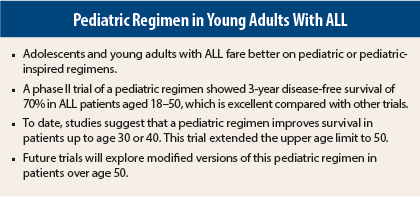Adolescents and younger adults with acute lymphoblastic leukemia (ALL) had superior outcomes on a “pediatric” regimen compared with adult treatment protocols. A multicenter phase II study included patients aged 18–50, extending the upper limit of “younger,” since most other trials of this approach include patients up to age 30 or 40.
Three-year overall survival was 75%, and 3-year disease-free survival was 73% in this trial,1 which was reported at the 57th American Society of Hematology Annual Meeting and Exposition.
“In this trial, we took our own Dana-Farber Cancer Institute pediatric protocol for patients aged 1–18 and used it in patients aged 18–50. Other trials of different pediatric-inspired regimens have had similar results. It’s just a different recipe. The take-home point is that overall survival and disease-free survival are improved compared with historical controls treated on prior adult regimens,” said lead author
Daniel DeAngelo, MD, PhD, of the Dana-Farber Cancer Institute, Boston.
“The regimen is tolerable in young adults with ALL and represents a major therapeutic advance,” he said, although there are still remaining challenges. Dr. DeAngelo pointed out that there are no phase III trials of pediatric-inspired regimens in younger adults with ALL. Thus far, all have been phase II studies.
Study Details
Dr. DeAngelo and colleagues previously used a pediatric drug combination that included Escherichia coli asparaginase, which achieved a 4-year disease-free survival of 67% and an overall survival rate of 69%.2 The current successor trial used the same regimen substituting weekly pegylated asparaginase, which is thought to be safer and longer lasting.
The study included 110 high-risk young adult patients with ALL treated with induction therapy; patients who achieved remission went on to 30 weeks of consolidation and 2 years of maintenance therapy. They were also treated with central nervous system prophylaxis consisting of intrathecal chemotherapy and radiation therapy.
“Due to toxicity concerns, we adjusted the pegylated asparaginase dose during consolidation and lengthened the interval to every 3 weeks, for a total of 10 doses instead of 15. Also, we reinserted native E coli asparaginase during induction,” Dr. DeAngelo told listeners. Anticoagulation was used during treatment with asparaginase, he added.
Of the 110 patients accrued to the trial, 65 were on the higher doses of pegylated asparaginase, and 45 were on the amended protocol. Median age was 32 years; 61% were male. Eighty percent of patients had B-cell ALL, and 20% had T-cell ALL.
Study Results and Toxicity
Eighty-nine percent of patients went into complete remission; 21 patients went on to transplant. There were three deaths due to transplant-related complications.
Subgroup analysis showed that patients younger than age 30 had a 4-year overall survival of 80%–85%, which was significantly better than for other age groups. Also, patients with T-cell ALL did particularly well on this protocol, with an overall survival of 80% and 70% for B-cell Philadelphia chromosome–negative ALL.
“A surprising finding was the association between poor overall survival based on body mass index. Underweight and normal weight patients did much better than obese patients. This is one more concern about obesity,” Dr. DeAngelo told listeners.
As expected, it appears that minimal residual disease–negative patients fared better than minimal residual disease–positive patients, but these data are not fully analyzed.
After the amended doses of asparaginase, grade 3 and 4 toxicities (hyperbilirubinemia, alanine transaminase level elevations, and risk of thrombosis) were reduced. The investigators noted that pegylated asparaginase had greater toxicity in older adults as well as in those with a high body mass index (> 30 kg/m2).
“We now anticoagulate everyone, preferably with low–molecular-weight heparin, and we have seen a dramatic reduction in line-associated clots,” he said.
“Many challenges remain, including psychosocial ones. We need a unified approach to make progress in ALL, and this means more cooperative group trials in adolescents and young adults with ALL,” he stated. ■
Disclosure: Dr. DeAngelo has been a consultant for Pfizer, Amgen, Incyte, Bristol-Myers Squibb, Agios, Ariad, Novartis, and Celgene.
References
1. DeAngelo DJ, Stevenson K, Neuberg DS, et al: A multicenter phase II study using a dose intensified pegylated–asparaginase pediatric regimen in adults with untreated acute lymphoblastic leukemia: A DFCI ALL Consortium trial. 2015 ASH Annual Meeting and Exposition. Abstract 80. Presented December 5, 2015.
2. DeAngelo DJ, Stevenson KE, Dahlberg SE, et al: Long-term outcome of a pediatric-inspired regimen used for adults aged 18–50 years with newly diagnosed acute lymphoblastic leukemia. Leukemia 29:526-534, 2015.



